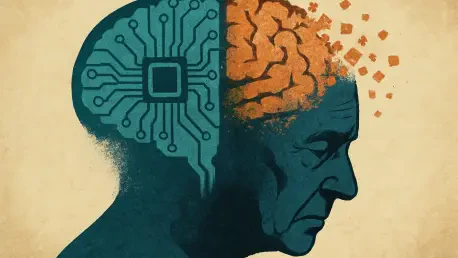Imagine a world where the tools designed to enhance productivity subtly erode the very skills that define human ingenuity, where reliance on artificial intelligence reshapes not just workflows but the brain itself. A groundbreaking study from the Massachusetts Institute of Technology has unveiled alarming insights into how prolonged use of AI tools might contribute to cognitive decline. This research, conducted with meticulous detail, suggests that over-dependence on technologies like language models could diminish critical thinking, memory retention, and creative synthesis. By comparing brain activity in individuals using AI for tasks against those working manually, the findings highlight a troubling trend of neural passivity. As society increasingly integrates AI into daily operations across various sectors, these revelations prompt a vital discussion on balancing technological convenience with the preservation of mental acuity. The implications extend beyond individual users to impact industries where sharp cognition remains paramount.
Unveiling the Neural Consequences of AI Dependency
The MIT research offers a stark look into how AI tools influence brain function, particularly through the use of EEG scans to monitor neural activity during writing tasks. Participants were divided into two groups: one group relied solely on AI to compose essays, while the other tackled the same tasks manually. The results were telling—those using AI exhibited significantly reduced activation in brain regions associated with memory, creativity, and critical analysis. This suggests that the brain, when relieved of traditional processing demands, may enter a state of cognitive passivity. Such a shift raises concerns about the long-term effects on mental sharpness, as the ease of automation could lead to a diminished capacity for independent thought. The study points to a phenomenon where users might gradually lose the ability to engage deeply with complex problems, relying instead on machine-generated solutions that lack the nuance of human insight.
Beyond the immediate neural impact, the research underscores a broader risk of intellectual atrophy among frequent AI users. The group dependent on AI produced work that, while functional, often lacked depth and originality, appearing mechanical and devoid of strategic thinking. In contrast, the manual group showed heightened brain activity in areas tied to visual processing and cognitive effort, indicating a more robust engagement with the task. This disparity draws a parallel to historical technological shifts, such as the introduction of calculators, which altered basic arithmetic skills. However, the stakes with AI seem far greater, given its pervasive role in decision-making across diverse fields. The potential for reduced attention spans and a growing reliance on automated outputs could fundamentally alter how individuals approach problem-solving, posing a challenge to maintaining the mental rigor necessary for innovation.
Sector-Specific Risks and Societal Implications
In high-stakes industries like healthcare, finance, engineering, and autonomous vehicle programming, the implications of cognitive decline due to AI reliance are particularly concerning. The MIT study highlights weaker brain connectivity and lower memory retention among those heavily using AI, alongside a diminished sense of ownership over generated outputs. Such trends could lead to critical errors or oversights in environments where human judgment remains indispensable. For instance, a surgeon or engineer overly dependent on AI assistance might miss nuanced details that automated systems fail to account for, potentially compromising safety and efficacy. The risk extends to the societal level as well, with fears that unchecked AI use could foster shallow or biased perspectives if users accept outputs without scrutiny. This underscores the need for vigilance in sectors where precision and accountability are non-negotiable.
Moreover, the societal dynamics of AI integration reveal a complex challenge in preserving human agency amidst technological advancement. The research suggests that as individuals become accustomed to AI-driven solutions, there is a subtle erosion of personal responsibility for the work produced. This detachment could have far-reaching effects, particularly in educational and professional settings where original thought is valued. The concern is not merely about individual cognition but about how entire communities might internalize a culture of dependency, potentially stifling innovation at a collective level. Addressing this requires a concerted effort to ensure that AI serves as a supportive tool rather than a replacement for human intellect, especially in fields that shape the future of technology and policy. The balance between leveraging efficiency and safeguarding mental engagement emerges as a pressing priority for leaders and educators alike.
Strategies for Mitigating Cognitive Risks
To counteract the risks identified in the MIT study, experts advocate for moderation and strategic integration of AI tools into daily practices. One proposed solution is the concept of periodic “AI detox” periods, during which individuals revert to manual tasks to stimulate neural pathways and rebuild cognitive resilience. This approach aims to prevent the brain from becoming overly reliant on automation, encouraging active engagement with problem-solving processes. Additionally, wellness programs in workplaces could monitor AI usage, ensuring that employees maintain a healthy balance between technological assistance and independent effort. Such initiatives reflect a growing recognition that while AI can enhance productivity, its unchecked use might come at the expense of intellectual vitality, necessitating proactive measures to preserve mental sharpness.
Another critical recommendation focuses on adopting hybrid training protocols that combine AI assistance with traditional skill-building exercises. By integrating both methods, individuals can harness the benefits of technology while continuing to develop critical thinking and creative capacities. This balanced approach is particularly relevant in educational settings, where fostering analytical skills remains essential for future generations. The emphasis lies on cultivating an environment where AI acts as a complement to human effort rather than a substitute, ensuring that users retain the ability to question and refine automated outputs. As industries evolve with increasing AI integration, these strategies offer a pathway to mitigate cognitive decline, promoting a synergy between human and machine that prioritizes long-term mental health and innovation.
Reflecting on a Path Forward
Looking back, the MIT study served as a crucial wake-up call, shedding light on the unintended consequences of AI over-reliance and its impact on cognitive function. The evidence of reduced neural engagement and the risks to critical industries painted a sobering picture of what unchecked dependency could entail. Yet, it also sparked a meaningful dialogue about the importance of preserving human intellect in an era of rapid technological advancement. The insights gained from this research laid the groundwork for a deeper understanding of how to navigate the delicate balance between efficiency and mental acuity. Moving forward, the focus should shift to implementing structured guidelines for AI use, encouraging periodic breaks from automation, and fostering hybrid learning environments. By prioritizing these actionable steps, society can ensure that AI remains a powerful ally in progress without compromising the essence of human thought and creativity.









